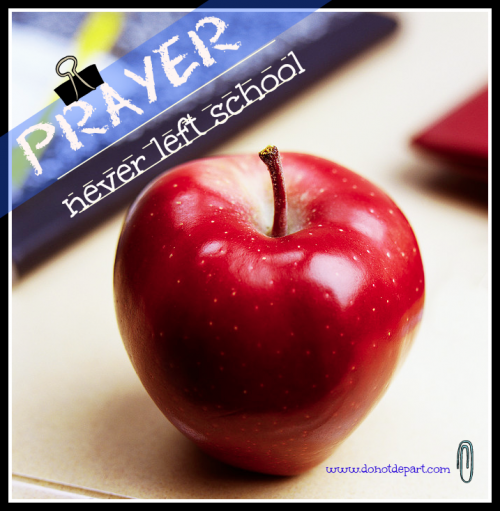How is a christian child supposed to live out their faith at school if they can’t pray? As a teacher, daily I heard the voice over the intercom declaring a “moment of silence,” as if someone in an office far away had the power to stop or start it. A “moment of silence,” code words for prayer, was announced to appease those who objected to banishing of prayer in public schools. But prayer never left school.
As long as children know to turn to the ever-present God who hears them from their desk, their locker, the playground, or the cafeteria, prayer cannot be crushed. Heavenward cries cannot be legislated, though some may try. Having spent years as a public school teacher, I have watched believing children shine as lights in their school. Praying parents are still able to send their children armed with the voice of petition when they head off to a traditional classroom.
The best lesson a child ever learns in public school may be how to pray, and they won’t be guide by that far off voice declaring “the moment of silence.” They will still tune in to the trusted and loving voice of their prayerful parent. We can help children learn to make prayer their own, to make it personal, while in a not-so-open environment.
Teach children to initiate prayer.
- Call on God anytime.
- Call on God anywhere.
Teach children to make prayer personal.
- Call on God in your own heart, thoughts, and mind.
- Call on God for your own needs, concerns, and feelings.
Feeling prayer pressure forces a child to learn how to turn their thoughts and their silent conversations to the Lord, their Lord, as they encounter trouble of their own or see others in trouble. There’s no need to wait for a moment of silence or even the freedom of home; we can teach our children to be kids who pray in a world that won’t.
“In all circumstances take up the shield of faith, with which you can extinguish all the flaming darts of the evil one; and take the helmet of salvation, and the sword of the Spirit, which is the word of God, praying at all times in the Spirit, with all prayer and supplication. To that end keep alert with all perseverance, making supplication for all the saints,” (Ephesians 6:16-18).
Prayer depends on our commitment to communicate with our waiting God, not the setting where we do our days.
- Start your child’s day with prayer, before they ever enter a “legislated” world.
- Role play how to pray when they encounter a need or a prompting to talk to God.
- Talk about how to use a “moment of silence” and what to do if/when it is announced.
- Consider tools like keeping a small prayer notebook or card in their desk/locker.
- A lunch box is the perfect place to insert prayerful words of encouragement.
- Pray together about the concerns of the traditional school world.
Don’t wait for the designated moment of silence. Begin your child’s day with prayer and show them that prayer goes anywhere the people of God go.

Teaching our children to call on God anytime, anywhere is a strong point — for all of us to remember!
I love that you included this tip, too: “Talk about how to use a “moment of silence” and what to do if/when it is announced.” We grew up just used to those “moments of silence,” but it’s such a good idea to actually discuss as a family how to best use those moments. Thanks for adding that tip, Julie!
As a substitute teacher several years ago, I watched students during that “moment” and realized many of them just didn’t know “how” to use it … even kids I knew were from believing families. I decided then that I wanted our kids to “hear” our voices as parents, guiding them through the use of that quiet moment.
I remember a few tragic moments when my principal or teacher said something along the lines of “pray or do whatever it is you do” instead of declaring a moment of silence, and Christians were allowed to and frequently did pray publicly. It was permitted as long as it was not done in an official capacity as a representative of the state. I actually would not have had it any other way. No one can take away my ability to pray. If they silence me, the Holy Spirit will intercede for me. If they kill me, I can talk to God face-to-face. Therefore, I was never concerned about any restrictions the law might place on me when I was a student. What did concern me were the students who wanted a common prayer. If someone is leading a common prayer and you have no knowledge of that person’s beliefs, do you really want to participate in such a prayer, not knowing if it is directed to the God to whom you pray? I would rather have my private prayers in school and reserve public prayer for church and family gatherings.
“Tragic” is a good description, as those comments really minimize and mock the prayers of those children about to talk to their listening Lord. I love your declaration that “No one can take away my ability to pray.” It’s a valuable truth for us to pass on to our children as they live in the world, but not of it. They can and should call out to the Lord any time and anywhere.
All children should be taught to pray and have the fear (reverence) and admonition of God.
Well said, Robert. Can’t imagine sending children out into the world without it.
So important for our children to be equipped to pray in any and all circumstances. Great thoughts here Julie. Thank you!
And I love knowing it’s a spiritual tool they can take with them wherever they go!